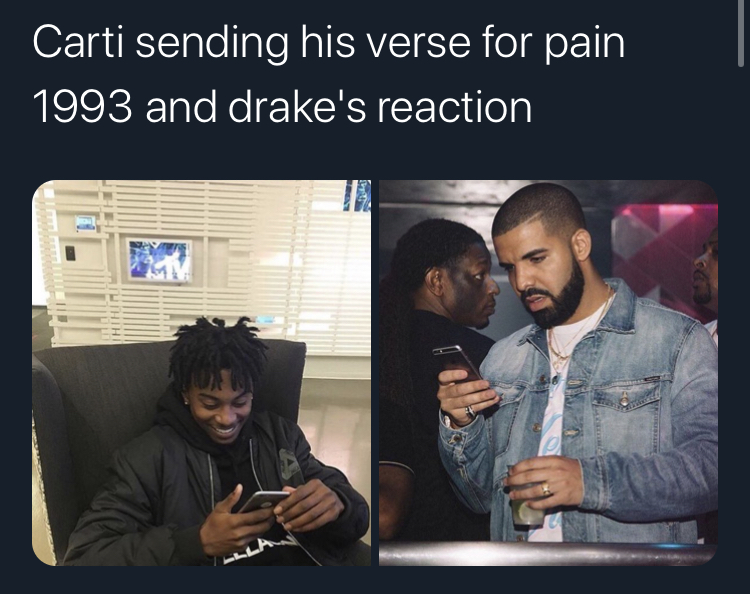
Graeme Jackson
Photo Editor
Toronto’s very own self-proclaimed “6 God” Drake has been busy during quarantine, cultivating a collection of fourteen tracks to release to fans in the form of a project titled Dark Lane Demo Tapes. Prolifically releasing music has always been Drake’s modus operandi, but the 6 God hasn’t released a major studio album since 2018’s Scorpion. Dark Lane Demo Tapes features tracks that have been scattered around the internet within the last few months, combined with some b-sides and collaborations with other industry mainstays like Future and Playboi Carti.
“When To Say When” and “Chicago Freestyle” follow the opening track and come off as two of the more polished tracks in terms of production, flow, and lyricism. “When To Say When” features a beat with a vocal sample from Jay-Z’s “Song Cry,” providing heart-to-heart style bars with an elegant backing that invites the listener to reminisce and reflect with Champagne Papi.
“Chicago Freestyle” continues the aura of elegance from the previous track with ease, as featured artist Giveon graces the track’s chorus with pensive lyrics and colorful soundscapes. Drake’s verses revolve around paranoia and his desire to keep a low profile given his current status in hip-hop. In this song, Drake pays homage to another hip-hop titan in his integration of bars and flow from Eminem’s 2002 song “Superman.” The lyrical content addressing the unfavorable realities associated with being a cultural icon, combined with interpolation of elements from two other hip-hop icons in “When To Say When” and “Chicago Freestyle,” equate Drake’s status in hip-hop to that of his most successful contemporaries.
From here, the mixtape slows down in pace with “Not You Too” featuring Chris Brown, who provides support to Drake’s vague relationship bars. The lack of vocal chemistry from the pair over a woozy, sluggish beat makes this track one of the weaker ones on the project.
“Toosie Slide” is Drake’s first real stab at jumping into the “dance craze” virality provided by the TikTok cultural sphere. Originally released in early April, the song has a decent hook and refrain that weave together dance move instructions to its listeners. As a near-omnipresent cultural force, Drake is no stranger to being memed or having his work inspire these online trends, but the song comes off as an obvious and tepid shot from the Toronto native. The rapper’s very clear attempt to inorganically create a viral dance ultimately makes “Toosie Slide” a disappointing single.
“Landed” and “D4L” ramp up the tempo again, coming in with the more traditional lo-fi trap sonics that Drake has come to be known for. On “Landed,” fast-paced braggadocious bars paired with an incredibly catchy hook make the song one of the more memorable points on the mixtape. “D4L” features Future and Young Thug delivering some well-structured back-and-forth lines on the chorus, as their Atlanta trap roots come through to really own the track.
“Pain 1993” featuring Playboi Carti was one of the most highly anticipated records prior to its release as Drake had teased it over Instagram live in early April. Drake lays the groundwork on the track with a snappy, subdued triplet flow and a memorable hook. However, Playboi Carti comes in with quite possibly his worst ever feature in hip-hop. His ridiculous high-pitched voice is so thin and distorted that any and all lyrical content gets lost in the wind. Unfortunately this will likely be a track that listeners hit skip on before Carti’s verse.

The project winds down towards the end on “Losses,” where Drake describes a relationship that fell apart due to his involvement in the rap game. The track features snippets of dialogue between Drake and his father, with whom he has described a tumultuous relationship over the course of his vast discography. These snippets contextualize his bars and ultimately illustrate that he’s more concerned with working through problems with those he cares about, like his family, than he is with squashing petty issues stemming from his life in hip-hop.
Drake’s ability to keep fans satisfied with near-constant releases of songs from his unreleased catalog is undoubtedly admirable. While Dark Lane Demo Tapes showed fans the 6 God is still hard at work collaborating and refining his craft, it definitely left something to be desired in the area of lyrical content and production. But if Drake was looking to build hype for his next full-length studio album and get people talking, it certainly seems like he achieved that goal.










